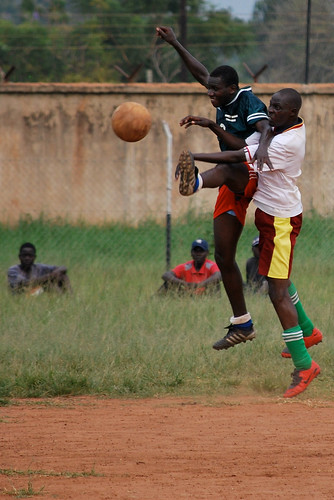When Pele famously predicted that "an African nation will win the World Cup before the year 2000" he was basing his judgement on the talent coming through in Africa, specifically the Nigerian side that in 1993 won the U17s World Cup. Given the performances of that team, and the increasing number of African players making it to the highest level it was a reasonable enough prediction to make.
Except that talent isn't enough. As Simon Kuper and Stefan Syzmansky discussed in their book Soccernomics, it also takes a stable enough economic and political climate for a country's football team to excel at the highest level.
If that sounds too theoretical, then it is best to consider its implications. In countries like Spain, Italy, Brazil and France (to mention the past four World Cup winners) there are clubs - not one or two but many - that are economically strong enough to finance youth systems which identify talent and provide coaching from an early age. These clubs can afford a whole host of coaches to provide this training, educating them on the philosophy of the club which philosophy has at least in part been shaped by what has been learned from history as well as from other clubs.
There is a self-sustaining eco-system that delivers players who not only have the technical ability but also tactical intelligence needed to win at the highest level.
In Africa, such systems do not exist. True, football is widely played and this does lead to highly technical individuals but there are also huge gaps in so far as the player's tactical education is concerned as well as the ability to handle the mental pressure inherent to the professional game.
It is something that Enrique Diaz Duran has discovered since last year joining South African side Mamelodi Sundown as the technical co-ordinator of the youth sector. "Players do not begin to be introduced to the technical and tactical concepts until they are 16 or 17, something that children in Europe have mastered by the time they are 8 or 9," he said in an interview with Blueprint for Football.
Further backing for this failing comes from Ivory Coast. The bulk of one of the finest teams ever to emerge in Africa - Gervinho, Bakari Kone, Arouna Kone, Kolo Toure, Yaya Toure, Didier Ya Konan, Lacina Traore, Ndri Romaric, Didier Zokora, Aruna Dindane, Salomon Kalou, Emmanuel Eboue, Arthur Boka, Siaka Tiene - was developed in one place: Jean-Marc Guillou Academies. There they received the level of coaching which is commonplace in Europe so much that when it came to integrating European football they could do so with relative ease.
Guillou is now doing the same thing in Algeria - as detailed in this article by Maher Mezahi - and it seems as if the results will be just as rich. But until there are similar academies peppered all over the continent, it is doubtful whether Africa will fulfill its potential on the global stage.
This piece was originally published in Issue 2 of Blueprint for Football's free bi-weekly e-zine that was sent out on the 12th of January. For exclusive content, snippets of future articles and links to the best football articles around, subscribe here.


No comments:
Post a Comment